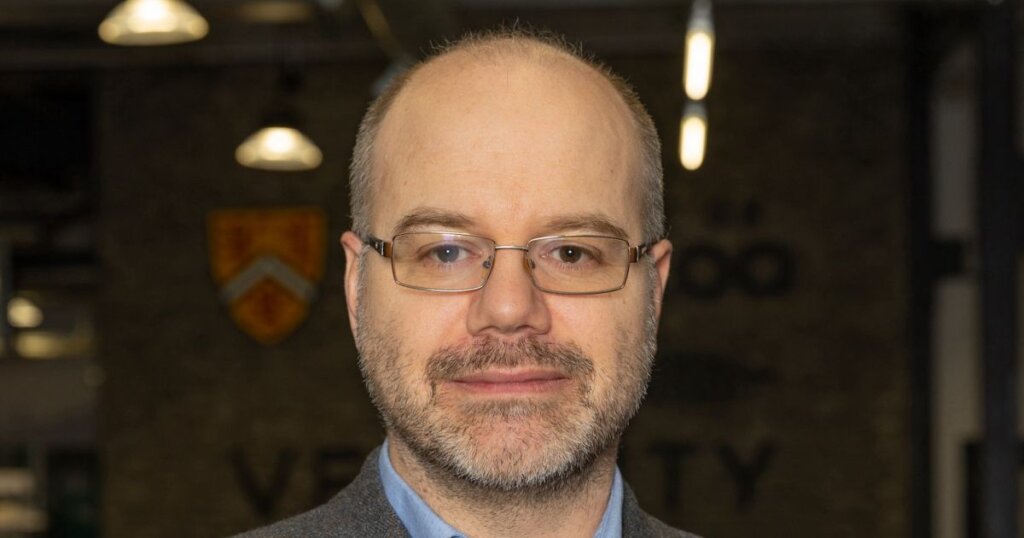Home » Cyber protection for the supply chain
Cyber protection for the supply chain

What happens if a bad actor sells counterfeit or hacked upgrades to a military customer? Will the fighter jet be able to launch its payload or defend itself? Will it even get off the ground?
Much attention has been paid to hacker groups that penetrate critical computer infrastructure, but what happens if someone compromises components prior to installation?
This is the supply chain vulnerability that Waterloo Region-based Palitronica Inc. is addressing with its physics-based approach to cyber defence and security.
The company (its name is a combination of its “Palisade” product and the word “electronics”) was launched in 2019 after being developed at the Real-time Embedded Software Lab at the University of Waterloo. The Palisade suite can detect hardware tampering, connectivity modifications, falsification attempts and ransomware attacks.
Palitronica’s unique approach was recently recognized by the Waterloo Institute for Sustainable Aeronautics (WISA) with a $50,000 prize in its 2023 Sustainable Future Competition.
The annual competition supports sustainable solutions to the challenges of the aviation or aerospace sectors. In a news release, WISA said of Palitronica, “By detecting counterfeit techniques and addressing risks associated with recycled, counterfeit, tampered or back-doored parts prevalent in the global advanced electronics market, Palitronica is revolutionizing asset protection in the industry.”
This is the second high-profile acknowledgement for Palitronica. Last year, the company was named the Most Innovative Security-Focused Company of 2022 at the 10th annual Discovery Event, hosted by In-Q-Tel and Silicon Valley Bank in San Francisco. That event, which attracted 120 entrants, is widely viewed as a tech scouting opportunity for the American intelligence community.
For CEO and co-founder Sebastian Fischmeister, a computer and electrical engineering professor at UW, this has been a 10-year journey. Although the WISA award focused on aviation and aerospace, Fischmeister says there are many potential clients in Canada’s critical infrastructure sector, such as automotive, oil and nuclear power sectors.
The pandemic demonstrated the shortfall in silicon chip production and delivery, which has emboldened some players to recycle chips and sell them as new, or simply counterfeit them.
Just last month, an American pleaded guilty in a U.S. court to selling more than $100 million of counterfeit networking equipment to American government agencies and the military, using 19 shell companies to bring devices imported from China and Hong Kong that had been disguised with bogus Cisco labels and documentation.
Palitronica focuses on the supply chain, “so that the parts you get are not pre-compromised, so the parts are good,” Fischmeister says. “Traditionally, people have only looked at functional correctness, not at the security aspect…. It is no longer enough to have a safe product. You must have a safe and secure product.”
Palitronica’s team of 11 software and hardware engineers won demonstrator contracts with Canada’s Department of National Defence, and in 2021, partnered with Bruce Power, Natural Resources Canada and UW to develop systems for the supply chain in Canada’s energy sector.
In May of this year, Palitronica was named by Arcfield Canada Corp. as one of the partner agencies in Team Northern Sentry, which is one of the applicants seeking to maintain and upgrade the RCAF CF-18 fighter fleet to fulfil its NATO and NORAD duties up until its expected service end in 2032.
These partnerships are the first step, says Fischmeister. “For us, the goal is to first establish this in Canada, then in NATO countries and then go to the U.S.”
The Palitronica system itself is brilliant in its simplicity. Fischmeister says it is analogous to shouting at the mouth of a cave and listening for the echo. If the echo is modified, then something inside the cave has changed. The Palitronica signal is looking for parts that don’t reflect the signature of authentic, unaltered components. Get a bad “echo” and there is something wrong.
Part of the company’s success comes from being immersed in the Waterloo Region ecosystem. Palitronica has its headquarters in the Communitech Hub and a partner lab at UW.
“With the tech talent we have here, it’s just perfect,” Fischmeister says.
He also notes the value of UW’s intellectual property policy, which allows IP to be owned by the creator. Some other universities demand a percentage ownership – up to 100 per cent in some cases.
“How does that entice” faculty and staff to innovate at such institutions, Fischmeister asks.
Communitech
https://communitech.ca
"Communitech helps tech-driven companies start, grow and succeed. Communitech was founded in 1997 by a group of entrepreneurs committed to making Waterloo Region a global innovation leader. At the time it was crazy talk, but somehow this community managed to pull it off. Today, Communitech is a public-private innovation hub that supports a community of more than 1400 companies — from startups to scale-ups to large global players. Communitech helps tech companies start, grow and succeed in three distinct ways: - Communitech is a place – the center of gravity for entrepreneurs and innovators. A clubhouse for building cool shit and great companies. - Communitech delivers programs – helping companies at all stages with access to capital, customers and talent. We are here to help them grow and innovate. - Communitech partners in building a world-leading ecosystem – making sure we have all the ingredients (and the brand) to go from a small startup to a global giant."


